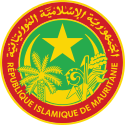User:Tidjani Saleh/sandbox/Left-wing politics in Mauritania
 |
|---|
|
|
|
|
Left-wing politics appeared late in Mauritania compared to other Arab countries, but were politically and culturally influent. The main representative of the Mauritanian left has been the Kadihines or Toilers movement, with leftists in Mauritania being called either leftists, progressives or toilers.
Background
editLeft-wing politics reached the Mauritanian political arena in the late 1960s due to the return of Mauritanian students from abroad. These students mostly studied in Arab countries, in Senegal or in France, where they got in touch with Marxist, anti-colonialist and Pan-Arabist currents. However, the defeat of Arab forces in the Six-Day War led to a decline of the Arab nationalist current, represented by the Arab Nationalist Movement and heavily influenced by George Habash, and its further replacement with Marxist and Maoist theory.[1]
The emergence of the Mauritanian left was triggered the violent answer of the Mauritanian authorities towards workers' protests, with the assasination of workers of the MIFERMA mining company in Zouérate in 1968 becoming a symbol of police brutality in Mauritania. Several factors have influenced the Mauritanian left and its growth: the growing Arab socialist wave that dominated most Arab countries in the 1950s, the decolonisation of the African continent, the Cold War between the Soviet-led Eastern Bloc and the US-dominated Western Bloc and the student-led 1968 protests, especially the May 68 in France.[1]
It is considered that the first Mauritanian left-wing movement was born on 23 July 1968, when the majority of youth and student groups of various tendencies who were residing at that time outside Mauritania participated in a conference held by Mauritanian students in Damascus, Syria.[1]
Political ideology
editThe Mauritanian Kadihines emerged as a left-wing political movement that focused in defending the oppressed classes and the proletariat (farmers, workers, artisans...), fighting against tribalism, slavery and fractionism, focusing instead on patriotism and the unity of the people of Mauritania based on the principles of egalitarianism and social justice.[2]
The Kadihine movement called for a "second independence" of the country, mostly focusing on the nationalisation of natural resources and Mauritania dropping the West African CFA franc and adopting a national currency instead.[3]
Relations with the Polisario Front
editRelations between the Kadihine movement and the Polisario Front have always been friendly. The Polisario Front used to print political statements from the printers of the National Democratic Movement, which even sent some volunteers to fight alongside POLISARIO.[4]
Political organisations
editThe first National Democratic Movement
editThe National Democratic Movement (MND) was founded in late 1968 in the Takomadi village in Gorgol, southern Mauritania.
Party of the Kadihines of Mauritania
editThe Party of the Kadihines of Mauritania (PKM) was clandestinely founded on 1 October 1973 as the successor of the MND.[5]
The second National Democratic Movement
editUnion of the Forces of Progress
editSee also
editReferences
edit- ^ a b c Ould Salek, Didi (29 June 2020). "اليسار الموريتاني.. تأثير في الماضي وتراجع في الحاضر (1من2)" [The Mauritanian left... influence in the past and decline in the present (1 out of 2)]. Arabi21 (in Arabic). Retrieved 16 November 2022.
- ^ Ould Messaoud, Hassan (25 November 2018). "اليسار الموريتاني تحت الأنقاض" [The Mauritanian left is in ruins]. Nouakchott.info (in Arabic). Retrieved 6 April 2023.
- ^ Ould Mohamed Salem, Lemine (2003). "De Ould Daddah à Ould Taya: la longue marche de la Mauritanie" [From Ould Daddah to Ould Taya: Mauritania's long march]. Géopolitique africaine (in French) (12): 175–190. Retrieved 17 November 2022.
- ^ "مستشار الرئيس الصحراوي يروي علاقة البوليساريو بالحركة الوطنية الديمقراطية" [The Sahrawi President's advisor tells the Polisario's relationship with the National Democratic Movement]. AlAkhbar.info (in Arabic). 25 December 2019. Retrieved 16 November 2022.
- ^ El Mokhtar, Ahmed Salem (14 October 2021). "Quelques séquences de l'histoire des Kadihines (partie 18) : La proclamation du PKM" [Some sequences from the history of the Kadihines (part 18): The proclamation of the PKM]. Le Calame (in French). Retrieved 16 November 2022.
- ^ Bekay, Cheikh (17 August 1998). ""الحركة الوطنية الديموقراطية" تخرج من السرية وتنتخب هيئاتها القيادية" [The “National Democratic Movement” comes out of secrecy and elects its leadership bodies]. Al Hayat via Maurinews.info (in Arabic). Retrieved 16 November 2022.